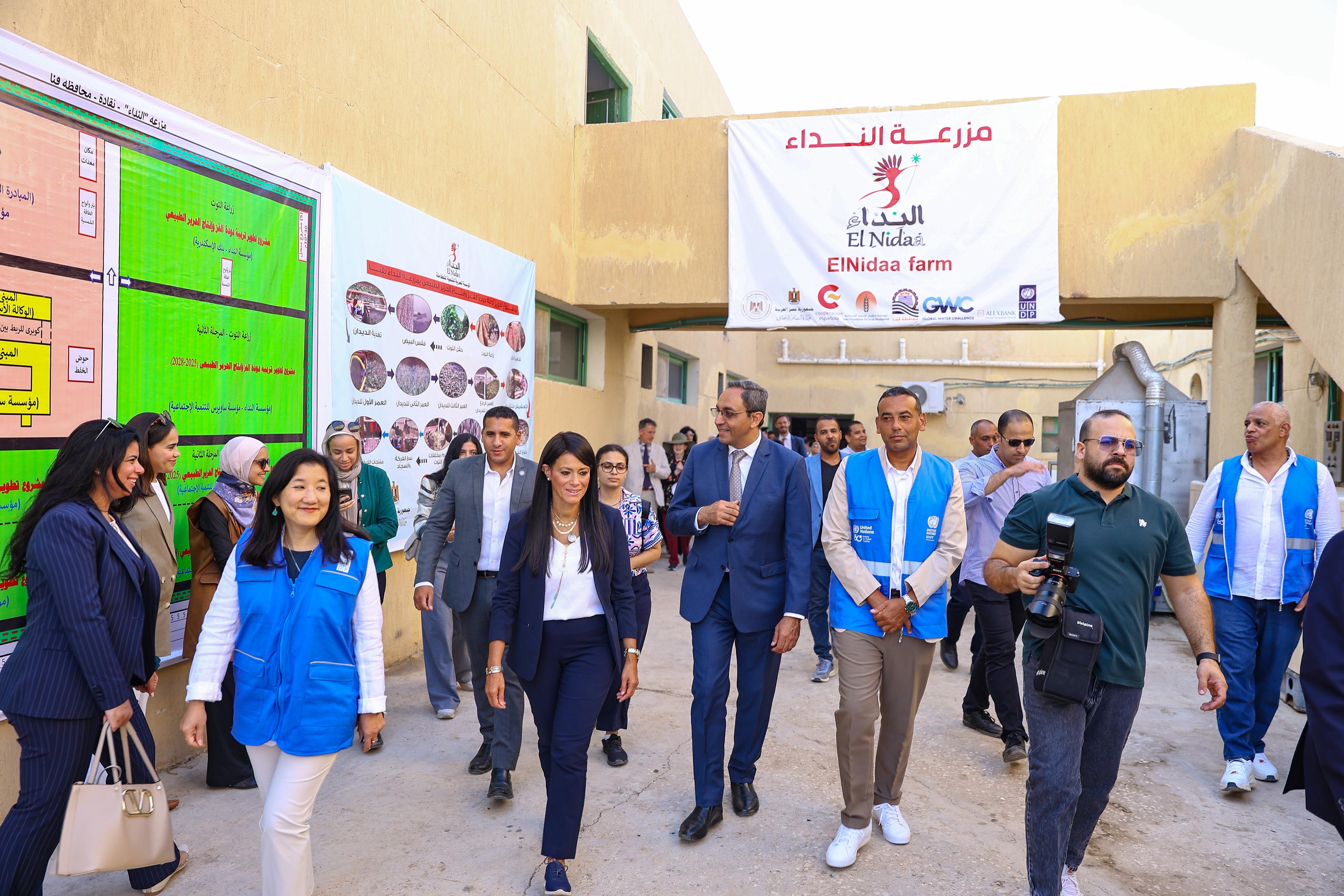● H.E. Dr. Rania Al-Mashat praised the efforts of the Egypt Foundation for Integrated Development (El Nidaa) in implementing numerous projects across Upper Egypt to create job opportunities and improve citizens’ livelihoods, in cooperation with national authorities and civil society organizations.
H.E. Dr. Rania A. Al-Mashat, Minister of Planning, Economic Development, and International Cooperation, laid the foundation stone for a silk production and sericulture factory, one of the projects implemented by the Egypt Foundation for Integrated Development (El Nidaa) in Qena Governorate. The ceremony was attended by Dr. Khaled Abdel Halim, Governor of Qena; Dr. Heba Handousa, Executive Director of El Nidaa; Ms. Elena Panova, UN Resident Coordinator in Egypt; and Ms. Chitose Noguchi, UNDP Resident Representative in Egypt. This marked the beginning of H.E. Dr. Al-Mashat’s visit to Qena to inspect several development projects as part of the celebrations for the 80th anniversary of the United Nations.
The silk factory consists of two floors covering 500 square meters. The ground floor is dedicated to sericulture and natural silk production, while the upper floor will focus on textile and carpet production using silk thread. The facility operates under the Egyptian Integrated Development Initiative, supervised by the United Nations Development Programme (UNDP) and the Ministry of Planning, Economic Development, and International Cooperation, with funding provided by the Spanish Agency for International Development Cooperation (AECID).
During her visit, H.E. Dr. Al-Mashat also toured El Nidaa’s silk production project at its Qena farm, which includes several key components, including a mulberry plantation essential for silk production.
H.E. Dr. Al-Mashat emphasized that the Egyptian silk industry in Qena plays a vital role in advancing women’s social and economic empowerment by providing sustainable job opportunities that benefit families and local communities. She highlighted that the project aligns with the United Nations Sustainable Development Goals (SDGs), particularly in eradicating poverty and creating decent work opportunities for women. This promotes social justice, fosters a safe and healthy environment, and enables citizens to thrive—significantly contributing to inclusive economic development.
She added that silk production is a labor-intensive industry that relies heavily on women, making it a critical source of income for villagers and low-income families. The industry also supports Egypt’s 2030 Sustainable Agricultural Development Strategy by encouraging growth in the silk sector, preserving traditional crafts such as natural silk carpet making, and opening new opportunities for development in Upper Egypt. H.E. Dr. Al-Mashat stressed the government’s commitment to supporting initiatives that revive traditional industries and crafts, thereby driving inclusive and sustainable development, particularly in Upper Egypt.
The Egypt Foundation for Integrated Development (El Nidaa) operates across five governorates—Qena, Luxor, Sohag, Minya, and Fayoum—focusing on strengthening small and medium-sized enterprises (SMEs) and entrepreneurship. Its programs support the government’s localization of industries, promote sustainable agricultural development, and advance knowledge dissemination.
H.E. Dr. Al-Mashat emphasized that the projects implemented under the Egyptian Integrated Development Initiative, in partnership with national authorities and civil society organizations, serve as exemplary models of targeted, impactful development efforts that directly improve the lives of citizens, particularly vulnerable groups. She commended Dr. Heba Handousa’s leadership since 2012, which has transformed communities in Upper Egypt by creating jobs, supporting micro-projects, and enhancing the livelihoods of thousands of citizens.
Ms. Chitose Noguchi, UNDP Resident Representative in Egypt, stated:
“The establishment of the first silk factory in Qena is a significant step highlighting the outstanding work of women who are reviving this traditional industry, preserving heritage, and simultaneously building modern industries. This achievement was made possible through our strong partnership with the Ministry of Planning, Economic Development, and International Cooperation, the Egypt Foundation for Integrated Development (El Nidaa), the Qena Governorate, and the generous support of Spanish cooperation. Together, we are strengthening local value chains and creating employment opportunities for future generations.”
The Egyptian Integrated Development Initiative (El Nidaa) is a national initiative launched in 2012 to maximize the developmental impact of UN interventions in Egypt and foster the economic and social development of vulnerable communities. The initiative operates in partnership with the Egyptian government, represented by the Ministry of International Cooperation, and the UNDP to provide sustainable, long-term job opportunities in Upper Egypt through four main pillars: basic services development, SME and entrepreneurship promotion, sustainable agricultural development, and knowledge dissemination.
